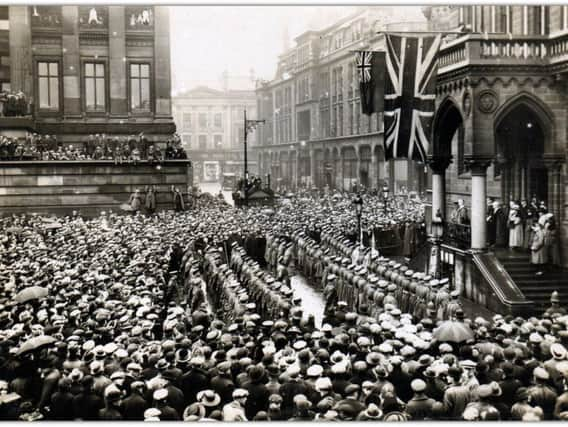Day Preston's war heroes came home


The end of the First World War in November 1918 did not immediately mark the end of service for Lancashire’s thousands of soldiers.
They were gradually released over the months following the armistice, so that by June 1919 their battalions were down to cadre strength of a just few dozen.
Advertisement
Hide AdAdvertisement
Hide AdThis month marks the 100th anniversary of the return of the Headquarters elements of four Preston-based battalions of the Loyal North Lancashire Regiment.
Two months after the 1st battalion arrived home, the last remaining officers and soldiers of the 2nd, 1/4th, 2/4th and 15th battalions were all greeted back in Preston.
The return of 2nd Battalion was recorded in the Lancashire Daily Post of June 5, 1919, “The Cadre of the 2nd Battalion Loyal North Lancashire returned with the colours to Preston last night, and the approach to the central railway station was thronged with people to welcome the homecoming warriors.
“The colour party were expected on a northbound train reaching Preston at 6pm but they arrived half an hour later. A number of officers from the garrison were waiting on the platform to receive the incoming troops. Before the party marched from the station, they were served with refreshments.
Advertisement
Hide AdAdvertisement
Hide Ad“Outside the station, the men formed in column of route and marched to the depot at Fulwood led by drums and bugles of the RFA and the band of the Loyal North Lancashire Regiment. The NCOs and men from abroad, with fixed bayonets, marched as a guard with the colours , and a detachment of the North Lancs from the garrison brought up the rear, with rifles at the slope. The progress of the troops along Fishergate was witnessed by a large number of people.”
The following week the cadres of 1/4th and 2/4th Battalions of the Loyal North Lancashires – both formed in 1914 from the pre-war 4th Battalion, the Preston Territorials - arrived back in Preston within days of each other.
For the 1/4th the return marked the final leg of their journey from Brussels, where they had been stationed since the end of the war. Looking, ‘remarkably fit and deeply sun tanned’ the three officers and 19 other ranks were greeted by the band of the LNL Volunteer Battalion and more than 600 demobilised and discharged officers and men from the battalion who were already back in Lancashire.
The band lead the soldiers along Fishergate in front of thousands of cheering onlookers some of whom broke free and mobbed their loved ones when they came into view. Their return was almost four years to the day after their first action on the Western Front at the Battle of Festubert and some of the returning soldiers had been away since those early days.
Advertisement
Hide AdAdvertisement
Hide AdThe 2/4th Battalion had been based in Arras in France since the end of the war. They had been sent out in February 1917 and served with the 57th (West Lancashire) Division.During the whole course of the war, the two Preston Territorial battalions lost a total of 69 officers and 1,232 men killed.
The Lancashire Daily Post of June 12 reported, “The Mayor said that he did not know what their own thoughts about it all were. As the end came their one idea was to get back to their own homes and to lead their old peaceful lives and forget, if they could, all that had gone by in those eventful years as just a bad dream.
“He wanted to tell them how proud they were of their valour in the field and the patience with which they had sustained all the trials through which they had gone, trials of patience and endurance such as one would have thought human beings could not possibly survive.
“They had gone down, as had been said, to the very nethermost of hell, and the great thing was not that so many should have died but that so many should have survived. Now they had come to the very last act and the curtain was about to fall. Their duty there was to crown them figuratively with the laurels of victory for their great share in a great victory.”
Advertisement
Hide AdAdvertisement
Hide AdFor the territorials a civic reception was held in the old Guild Hall with invitations sent out to comrades who had already returned to Lancashire to join them for the occasion. The two officers and 25 men of the 15th Battalion arrived back in Preston with less of a fanfare, the battalion having only been formed in July 1918.
